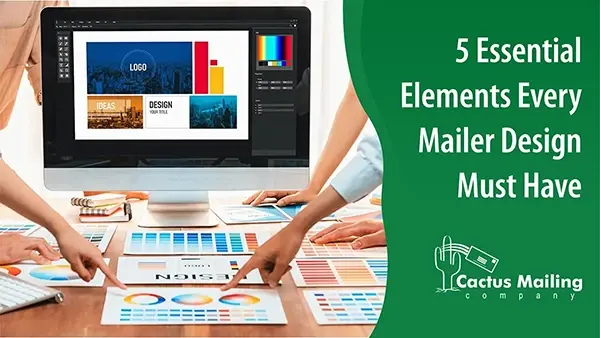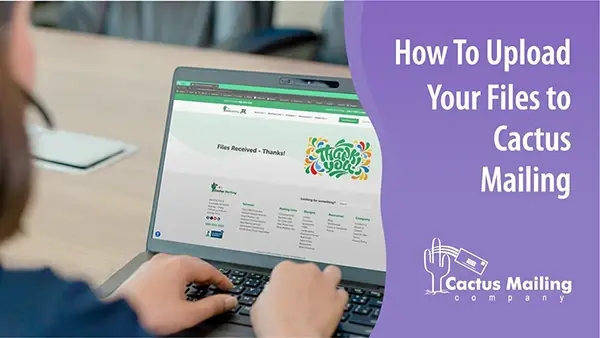We Are Here to Help!
What to Expect from Us:
No Pressure, Just Service!
Get no obligation pricing details and strategies that will work for your business.
Are you trying to design a mailer for your next direct mail campaign, but it's just not coming together? Direct mail campaign success hinges on having a great design that captures the attention and the imagination of your audience. It can take years to find the winning formula to create a perfect direct mail piece, but Cactus Mailing has the winning insider tips for you!
In this article, we'll discuss effective direct mail design in more detail and explain why we feel that direct mail postcards are the way to go.
Choosing the Format of Your Direct Mail Piece
When it comes to direct mail marketing, choosing the right format for your direct mail piece is a crucial decision. We've found that postcards work better than brochures or sealed letters and flyers. Here are a few reasons why:
Immediate Impact
Postcards offer an immediate visual impact. Recipients can see the message and the design as soon as they retrieve the postcard from their mailbox. In contrast, sealed letters require opening, flyers, and brochures to unfold, and only then can the content be fully appreciated. Postcards are open and inviting, increasing the likelihood that your message will be seen and read.
Cost-Effective
Postcards are generally more cost-effective to produce and mail than sealed letters, flyers, or brochures. They require less paper, no envelopes, and lower postage costs since they qualify for postcard rates, making them the most affordable option for direct mailers. This cost efficiency allows you to reach a larger audience within your budget.
Concise Messaging
Postcards force you to be concise and focused in your messaging. Their limited space encourages brevity, ensuring that you deliver a clear and straightforward message. Flyers and brochures, while offering more space, can sometimes overwhelm recipients with too much information.
Visual Appeal
Postcards can feature eye-catching visuals and graphics on the front, which immediately grab the recipient's attention. This visual appeal is essential for making a strong first impression and conveying your brand's identity. Sealed letters, flyers, and brochures may not have the same visual impact.
Make sure that you find a printing company that specializes in postcard design if you decide to go this route!
The Elements That Make For Effective Design
With 20 years of experience in the direct mail industry, we've learned a thing or two about effective direct mail design. We found 13 design elements that are very important when it comes to direct mail, divided into two categories:
- Elements that boost impact and response rates
- Elements that convey reputation and legitimacy
It's not necessary to include all 13 elements on your postcard. In general, include as many as you can without compromising the flow of the card and your message. Let's take a closer look at our recipe for design success.
Five Elements That Boost Impact and Response Rates
Impact and response rates are essential metrics that help assess the effectiveness of a marketing campaign, including direct mail campaigns like postcard marketing.
The impact rate measures how effectively a marketing message captures the attention and leaves an impression on the target audience. A high impact rate means your marketing piece, e.g., a postcard, successfully grabs the recipient's attention and stands out from other mail and marketing materials. Impactful postcards are more likely to be remembered by recipients. They leave a lasting impression, increasing the likelihood that the recipient will recall your message and take action.
The design elements, including visuals, headlines, and overall aesthetics, play a significant role in determining the impact rate. Creative and well-executed design can boost the impact of your postcard.
The response rate is a key indicator of conversion. It measures how effectively a marketing campaign, including direct mail, prompts recipients to take the desired action you've outlined in your call to action (CTA). In the context of postcard marketing, this action might include visiting a website, making a phone call, or redeeming an offer.
A well-designed postcard with a clear and compelling message, combined with an enticing offer or incentive, can significantly boost the response rate.
To boost your impact and retention rate, you should:
1. Start with a Compelling Headline

The headline of your postcard is like the front door to your message. It’s the first thing recipients see when they pick up your postcard. It sets the tone for the entire message, making a strong first impression. A clear and concise headline ensures that recipients understand the purpose of the postcard right away and should leave no room for confusion. A well-crafted headline not only captures attention but also encourages the recipient to read on and take the desired action, such as visiting a website or calling a phone number.
Headlines like "Claim your free annual dental check-up from ABC dentists now" or "Need a plumber in a hurry? Call us" are good examples of headings that get straight to the point and ensure your direct mail pieces make the impact you need.
Messages should feel personal to the recipient, even if you aren't using variable data printing or other forms of personalization in your campaign.
2. Use Subtext

While the headline grabs attention, the subtext engages the reader further by expanding on the message introduced in the headline. Most people only scan the headings and the subheadings when they receive direct mail, which is why concise yet informative subtext is so important in direct mail design.
You should use the subtext to convey your unique selling proposition. Explain why your local business is exceptional and how it benefits the recipient, or include some eye-catching facts about your company.
Good subtext might include "Trusted by Wisconsin for twenty years" or "The realtor that doesn't quit until she hands over the keys to your dream house!"
3. Use a Call to Action (CTA)

A clear and effective call to action is like a roadmap for your recipients. They need to know what they need to do next as soon as they look at your direct mail piece. It might be to visit a website, make a phone call, or claim a special offer. Make sure the CTA is straightforward and direct as ambiguity can lead to confusion and, ultimately, inaction. The CTA should create a sense of urgency or excitement, e.g., "Visit our store to claim your free offer" or "Hurry! Call ABC plumbing today to claim!"
4. Use High-Quality, High-Resolution Images

One of the tricks you should use in direct mail design is to use white space to make your message stand out. You can also use contrasting colors, bold fonts, or other design elements to ensure it's easily noticed. Busy backgrounds or low-resolution images can really detract from your message. Use high-quality stock images and passive white space to create an eye-catching design for your postcards.
Remember, consistency in imagery helps recipients recognize and remember your brand. Look for relevant images that evoke emotions and create a connection with the recipient. The right photo or graphic can make your postcard more engaging and memorable, so make sure that any stock images or graphics used are up to your brand standards.

5. Include an Offer or Incentive
Everyone loves a free gift or special discount. Offers or incentives capture your recipients’ attention straight off the bat. Providing something of value, such as a discount or exclusive deal, can significantly increase the likelihood of conversion.
Elements to Convey Reputation and Legitimacy
Building trust with your audience is essential for a successful direct mail campaign. Trust is the foundation of any successful business relationship. When recipients receive a postcard from an unfamiliar sender, they may naturally be skeptical. Demonstrating your reputation and legitimacy helps alleviate this skepticism and builds trust. Trustworthy businesses are more likely to win the trust of potential customers.
- Logo and Branding: Your logo is a visual representation of your brand, so it's important to display it prominently on your postcard. This will help to create brand awareness and make it more likely that recipients will remember your business. Additionally, ensuring consistent branding throughout your postcard design will help to create a cohesive and professional look that supports ongoing brand recognition and recall.
- Contact Information: Including multiple ways for recipients to contact you is essential for building credibility and trust. Make sure to include your phone number, email address, website, and social media handles. The more ways you give recipients to contact you, the more likely they are to do so.
- Accreditations or Affiliations: If your business is affiliated with recognized industry organizations or has received certifications, proudly displaying their logos can help to convey credibility. This shows that your business is legitimate and has met certain standards.
- Physical Address: A physical business address (as opposed to a P.O. Box) can also help to build trust. This shows that you have a real, tangible presence and are not just a fly-by-night operation.
- Website and Social Media: If you have a strong online presence, referencing your website and social media profiles on your postcard can help to build trust. This allows recipients to research your business further and see what other people are saying about you.
- Security Seals or Guarantees: If relevant, including security assurances or guarantees on your postcard can help to reassure recipients about the safety of their interactions with your business. This is especially important if your call to action involves online transactions.
- QR Codes: A QR code is a quick and easy way to provide recipients with additional information. You can use a QR code to link to a video, review page, or any other piece of content that you think would be valuable to your audience.
- Testimonials: If possible, add testimonials from happy clients to provide social evidence and build trust.

By including these elements in your postcard direct mail campaign, you can increase the chances of getting your message seen and remembered and, ultimately, generate leads and sales.
Remember, while it's not necessary to include all 13 elements on your postcard, the more you incorporate, the better, as long as the design flows naturally and effectively communicates your message. It's also a great idea to test different designs to see which one obtains the best result.
Conclusion
Direct mailing is a powerful strategy you can use to grab your audience's attention, but only if you have the right design elements in place. At Cactus Mailing, we've spent 20 years perfecting postcard design and distribution, so give us a call if you are interested in a free no-obligation marketing plan where we can help you maximize your direct mail efforts.

 Jill Brown: Oct 26, 2023
Jill Brown: Oct 26, 2023


 Joe McAtee
Joe McAtee
 Mike Ryan
Mike Ryan
 Mark Gerhardt
Mark Gerhardt